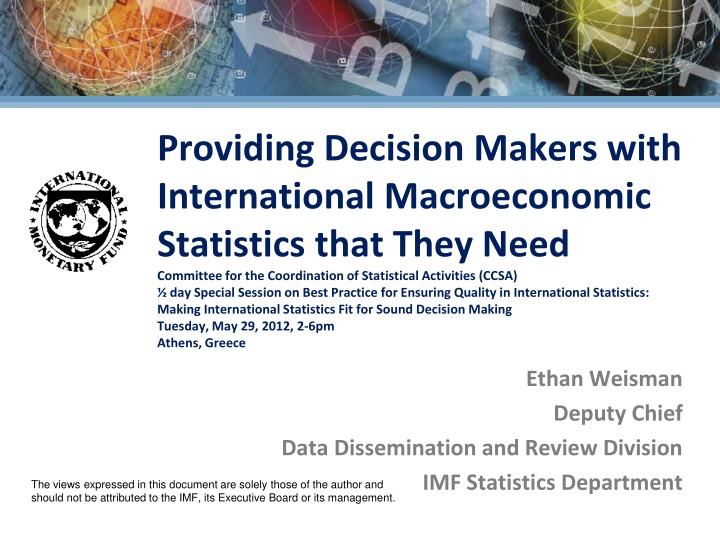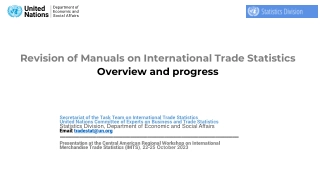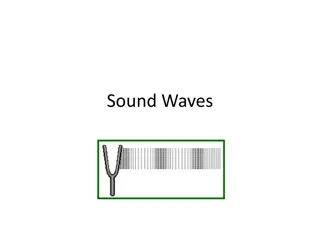International Macroeconomic Statistics for Sound Decision Making
Providing decision makers with the international macroeconomic statistics they need to ensure quality and fit for sound decision making. Challenges, responses, and frameworks discussed at a special session in Athens, Greece by the Committee for the Coordination of Statistical Activities. IMF's efforts in addressing data quality issues and enhancing data provision for surveillance purposes highlighted.
Download Presentation

Please find below an Image/Link to download the presentation.
The content on the website is provided AS IS for your information and personal use only. It may not be sold, licensed, or shared on other websites without obtaining consent from the author.If you encounter any issues during the download, it is possible that the publisher has removed the file from their server.
You are allowed to download the files provided on this website for personal or commercial use, subject to the condition that they are used lawfully. All files are the property of their respective owners.
The content on the website is provided AS IS for your information and personal use only. It may not be sold, licensed, or shared on other websites without obtaining consent from the author.
E N D
Presentation Transcript
Providing Decision Makers with International Macroeconomic Statistics that They Need Committee for the Coordination of Statistical Activities (CCSA) day Special Session on Best Practice for Ensuring Quality in International Statistics: Making International Statistics Fit for Sound Decision Making Tuesday, May 29, 2012, 2-6pm Athens, Greece Ethan Weisman Deputy Chief Data Dissemination and Review Division IMF Statistics Department The views expressed in this document are solely those of the author and should not be attributed to the IMF, its Executive Board or its management.
Statistics Department Audiences for Quality Macroeconomic Statistics The General Public Capital Markets National Policy Makers and Analysts Policy consultations with the IMF Bilateral Multilateral 2
Statistics Department Some Quality Challenges Multiple data sets (if conflicting) and fitness for use Availability (transparency) International comparability Inter-sectoral consistency Inter-temporal consistency Coverage Periodicity and timeliness Accuracy and reliability Frameworks and methodologies (valuation, time of recording, basis of recording, classification/sectorization, stock/flow consistency, aggregation/consolidation/netting, etc.) NB: Many quality aspects involve trade-offs! 3
Statistics Department IMF Responses to the Challenges (1/2) G-20 Data Gaps Initiative coordinated by the Inter-Agency Group on Economic and Financial Statistics (BIS, ECB, Eurostat, IMF (Chair), OECD, UN, WB) (see next slide) Data Provision to the Fund for Surveillance Purposes (and related surveillance information) Bilateral surveillance Staff assessments of data quality (A=Adequate, B=Broadly adequate with shortcomings, C=Hampering surveillance) Increasing focus on data quality, especially for financial sector data Multilateral surveillance Global, Regional and special reports (WEO, GFSR, Fiscal Monitor, REOs, as well as early warning and vulnerability exercises and financial sector interconnectedness and cluster analysis reports) 4
There Exist Conceptual/ Statistical Frameworks and Ongoing Collection Conceptual Statistical Framework Needs Further Development DATA GAPS # 2 Financial Soundness Indicators (FSIs) #5 Credit Default Swaps #7 Securities # 3 Tail Risk in the Financial System #4 Aggregate Leverage and Maturity Mismatches; #6 Structured Products Build-up of Risk in the Financial Sector # 10, #11, #12 Coordinated Portfolio Investment Survey, International Banking Statistics, International Investment Positions #8 and # 9 Global Network Connections and Systemically Important Global Institutions # 13 and #14 Financial and Nonfinancial Corporations Cross Border Exposures Cross-border Financial Linkages #15 Institutional Sector Accounts # 17 Government Finance Statistics # 18 Public Sector Debt #19 Real Estate Prices Vulnerability of Domestic Economies to Shocks #16 Distributional Information #20 Principal Global Indicators (PGIs) Improving Communication of Official Statistics 5
Statistics Department IMF Responses to the Challenges (2/2) The IMF s Data Quality Assessment Framework Data module of the Reports on the Observance of Standards and Codes (Data ROSCs) The Fund s Data Standards Initiatives: GDDS (a general development framework) SDDS (for economies that seek or have access to capital markets) SDDS Plus (recently approved by the IMF Executive Board, but not yet launched) 6
Statistics Department Thank you 7























